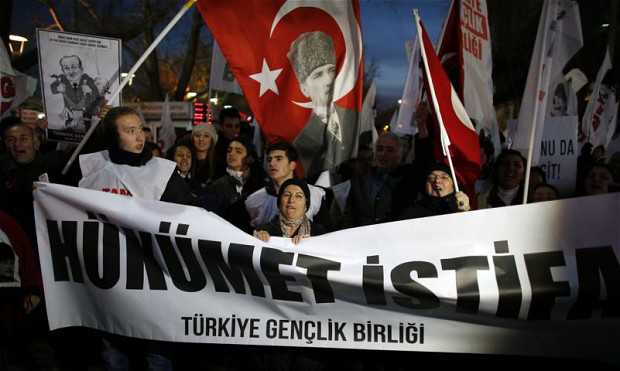Lira tumbles as Turkey goes from star performer to ‘sick man’ of the emerging market block

The Turkish lira has tumbled to a record low amid a deepening political crisis in Ankara, the first emerging market domino to wobble as the US Federal Reserve starts to wind down global dollar stimulus.
The currency has weakened by 6pc against the euro over the last two days, culminating a 25pc fall this year. Foreign funds have cut holdings of Turkish debt by a quarter since the May.
Turkey has gone from star performer to ‘sick man’ of the emerging market block as the Fed begins to taper bond purchases, a move that threatens to set off a further rotation of funds back into US dollar assets.
Turkey is the most vulnerable of the emerging market nexus
An estimated $4 trillion of foreign capital has flowed into the developed world since 2009, much of it ‘hot money’ chasing asset bubbles. Regulators are nervously eyeing yields on 10-year Treasuries as they touch 3pc, levels that could set off a scramble for dollars.
Pressure has been building this month on Indonesia, one of the “Fragile Five” (along with India, Brazil, South Africa, and Turkey) with big current account deficits. The rupiah fell to the lowest since 2008 yesterday, down 22pc this year.
Even the much lauded Philippines has been hit in recent days on fears of a broad- based “taper tantrum”, akin to events in May last year when tougher talk from Washington set off worldwide jitters.
Mark Carney, Governor of the Bank of England, warned before Christmas that the epicentre of global stress has shifted from West to East. “The greatest risk is the parallel banking sector in the big developing countries,” he said.
Emerging markets have been sputtering since 2011, with Brazil and Russia flirting with recession this year. Some have hit the buffers as the commodity supercycle fades or because they have exhausted the low hanging from fruit from their catch-up growth models.
The MSCI Emerging Markets index is down 9pc this year, in stark contrast to the 28pc boom on Wall Street’s S&P 500. Investors appear deeply divided over whether this is a “contrarian” chance to buy cheap.
The global bond giant Pimco says Fed tapering is already priced into markets, while countries have ample foreign reserves to counter shocks, unlike earlier Fed tightening episodes in the 1980s and 1990s.
Yet Goldman Sachs – once the cheerleader of the ‘BRICS’ – said the shift in global economic power had been over-dramatised and advised clients to trim emerging market holdings from 9pc to 6pc of their portfolio until the dust settles.
“The returns were not as attractive as expected, the economic growth rates were not as sustainable as imagined, and the countries were not as stable as believed,” it said.
Berkeley professor Barry Eichengreen said the coming turn in the Fed’s liquidity cycle remains a threat, with no guarantee that those with stronger fundamentals will be spared. “A revival of last summer’s emerging economy turmoil is a real concern,” he said.
Turkey has become the immediate flash point as the country’s political storm turns into a constitutional crisis. Recep Tayyip Erdogan, Turkey’s Islamist premier, fired half his cabinet on Thursday to tighten his grip.
A power struggle between rival forces of Turkey’s Islamist movement is threatening the rule of law itself. Istanbul’s prosecutor Muammer Akas has accused the government of ignoring court orders and blocking a probe into illegal tenders linked to Mr Erdogan’s circle.
Mr Erdogan has sought to bolster his popularity before elections next year with populist measures, while the central bank has burned through 15pc of Turkey’s foreign reserves to prop up the lira rather than tighten policy.
William Jackson from Capital Economics said the country is the most vulnerable of the emerging market nexus. Its external deficit – much of it owed by banks – is “funded almost entirely by short-term, and potentially volatile, portfolio inflows”.
Mr Jackson said private sector credit has risen by 10 percentage points of GDP over the last year, three times the safe speed limit. “Growth in Turkey is increasingly unsustainable,” he said.
The International Monetary Fund warned in October that Turkey must rein in spending to stop overheating and should abandon hopes for growth of 4pc to 5pc a year. “Foreign exchange rate interventions cannot substitute for the right monetary stance,” it said.
“The market reappraisal of advanced economies’ monetary policies has exposed Turkey’s main vulnerability — its external imbalance. A weakening or a reversal of capital flows present a major challenge,” it said.
For the last decade Mr Erdogan has promoted a form of “Muslim democracy” akin Christian democracy in Europe, but the Islamist character is becoming stronger as the ruling party dismantles the secular state dating back to Kemal Attaturk.
Civil rights abuses have become a serious worry. More reporters are in prison in Turkey than in any other country in the world, according to Committee to Protect Journalists.
Amnesty International accused the government of human rights violations on a “huge scale” when it crushed this summer’s Gezi Park protests with live ammunition. The clash left 8,000 injured and six dead, laying bare the deep divisions in Turkish society.
All six who died were Shia-linked Muslims, either Alevis or Allowites. While the protests were widely depicted in the West as a battle between Western-leaning students and Islamic conservatives, the deeper rift was between ruling Sunnis and large Shia minorities.
These fault lines were mostly covered over during Attaturk’s secular era. They have come to the surface as Mr Erdogan pushes his religious agenda further.
Turkey’s role in Syria’s civil war supporting Sunni rebels has become a fresh catalyst. Mid-East experts are increasingly worried that Syria’s bitter internal conflict is setting off a parallel sectarian struggle in Turkey.
